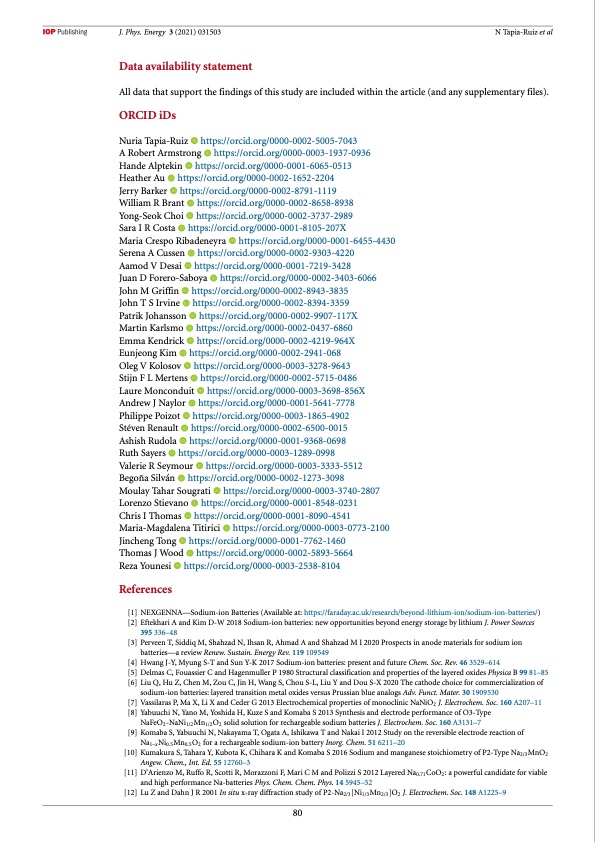
PDF Publication Title:
Text from PDF Page: 081
J. Phys. Energy 3 (2021) 031503 N Tapia-Ruiz et al Data availability statement All data that support the findings of this study are included within the article (and any supplementary files). ORCID iDs Nuria Tapia-Ruiz https://orcid.org/0000-0002-5005-7043 A Robert Armstrong https://orcid.org/0000-0003-1937-0936 Hande Alptekin https://orcid.org/0000-0001-6065-0513 Heather Au https://orcid.org/0000-0002-1652-2204 Jerry Barker https://orcid.org/0000-0002-8791-1119 William R Brant https://orcid.org/0000-0002-8658-8938 Yong-Seok Choi https://orcid.org/0000-0002-3737-2989 Sara I R Costa https://orcid.org/0000-0001-8105-207X Maria Crespo Ribadeneyra https://orcid.org/0000-0001-6455-4430 Serena A Cussen https://orcid.org/0000-0002-9303-4220 Aamod V Desai https://orcid.org/0000-0001-7219-3428 Juan D Forero-Saboya https://orcid.org/0000-0002-3403-6066 John M Griffin https://orcid.org/0000-0002-8943-3835 John T S Irvine https://orcid.org/0000-0002-8394-3359 Patrik Johansson https://orcid.org/0000-0002-9907-117X Martin Karlsmo https://orcid.org/0000-0002-0437-6860 Emma Kendrick https://orcid.org/0000-0002-4219-964X Eunjeong Kim https://orcid.org/0000-0002-2941-068 Oleg V Kolosov https://orcid.org/0000-0003-3278-9643 Stijn F L Mertens https://orcid.org/0000-0002-5715-0486 Laure Monconduit https://orcid.org/0000-0003-3698-856X Andrew J Naylor https://orcid.org/0000-0001-5641-7778 Philippe Poizot https://orcid.org/0000-0003-1865-4902 Stéven Renault https://orcid.org/0000-0002-6500-0015 Ashish Rudola https://orcid.org/0000-0001-9368-0698 Ruth Sayers https://orcid.org/0000-0003-1289-0998 Valerie R Seymour https://orcid.org/0000-0003-3333-5512 Begoña Silv ́an https://orcid.org/0000-0002-1273-3098 Moulay Tahar Sougrati https://orcid.org/0000-0003-3740-2807 Lorenzo Stievano https://orcid.org/0000-0001-8548-0231 Chris I Thomas https://orcid.org/0000-0001-8090-4541 Maria-Magdalena Titirici https://orcid.org/0000-0003-0773-2100 Jincheng Tong https://orcid.org/0000-0001-7762-1460 Thomas J Wood https://orcid.org/0000-0002-5893-5664 Reza Younesi https://orcid.org/0000-0003-2538-8104 References [1] NEXGENNA—Sodium-ion Batteries (Available at: https://faraday.ac.uk/research/beyond-lithium-ion/sodium-ion-batteries/) [2] Eftekhari A and Kim D-W 2018 Sodium-ion batteries: new opportunities beyond energy storage by lithium J. Power Sources 395 336–48 [3] Perveen T, Siddiq M, Shahzad N, Ihsan R, Ahmad A and Shahzad M I 2020 Prospects in anode materials for sodium ion batteries—a review Renew. Sustain. Energy Rev. 119 109549 [4] Hwang J-Y, Myung S-T and Sun Y-K 2017 Sodium-ion batteries: present and future Chem. Soc. Rev. 46 3529–614 [5] Delmas C, Fouassier C and Hagenmuller P 1980 Structural classification and properties of the layered oxides Physica B 99 81–85 [6] Liu Q, Hu Z, Chen M, Zou C, Jin H, Wang S, Chou S-L, Liu Y and Dou S-X 2020 The cathode choice for commercialization of sodium-ion batteries: layered transition metal oxides versus Prussian blue analogs Adv. Funct. Mater. 30 1909530 [7] Vassilaras P, Ma X, Li X and Ceder G 2013 Electrochemical properties of monoclinic NaNiO2 J. Electrochem. Soc. 160 A207–11 [8] Yabuuchi N, Yano M, Yoshida H, Kuze S and Komaba S 2013 Synthesis and electrode performance of O3-Type NaFeO2-NaNi1/2Mn1/2O2 solid solution for rechargeable sodium batteries J. Electrochem. Soc. 160 A3131–7 [9] Komaba S, Yabuuchi N, Nakayama T, Ogata A, Ishikawa T and Nakai I 2012 Study on the reversible electrode reaction of Na1–xNi0.5Mn0.5O2 for a rechargeable sodium-ion battery Inorg. Chem. 51 6211–20 [10] Kumakura S, Tahara Y, Kubota K, Chihara K and Komaba S 2016 Sodium and manganese stoichiometry of P2-Type Na2/3MnO2 Angew. Chem., Int. Ed. 55 12760–3 [11] D’Arienzo M, Ruffo R, Scotti R, Morazzoni F, Mari C M and Polizzi S 2012 Layered Na0.71CoO2: a powerful candidate for viable and high performance Na-batteries Phys. Chem. Chem. Phys. 14 5945–52 [12] Lu Z and Dahn J R 2001 In situ x-ray diffraction study of P2-Na2/3[Ni1/3Mn2/3]O2 J. Electrochem. Soc. 148 A1225–9 80PDF Image | roadmap for sodium-ion batteries

PDF Search Title:
roadmap for sodium-ion batteriesOriginal File Name Searched:
sodium-ion-batteries.pdfDIY PDF Search: Google It | Yahoo | Bing
Product and Development Focus for Infinity Turbine
ORC Waste Heat Turbine and ORC System Build Plans: All turbine plans are $10,000 each. This allows you to build a system and then consider licensing for production after you have completed and tested a unit.Redox Flow Battery Technology: With the advent of the new USA tax credits for producing and selling batteries ($35/kW) we are focussing on a simple flow battery using shipping containers as the modular electrolyte storage units with tax credits up to $140,000 per system. Our main focus is on the salt battery. This battery can be used for both thermal and electrical storage applications. We call it the Cogeneration Battery or Cogen Battery. One project is converting salt (brine) based water conditioners to simultaneously produce power. In addition, there are many opportunities to extract Lithium from brine (salt lakes, groundwater, and producer water).Salt water or brine are huge sources for lithium. Most of the worlds lithium is acquired from a brine source. It's even in seawater in a low concentration. Brine is also a byproduct of huge powerplants, which can now use that as an electrolyte and a huge flow battery (which allows storage at the source).We welcome any business and equipment inquiries, as well as licensing our turbines for manufacturing.| CONTACT TEL: 608-238-6001 Email: greg@infinityturbine.com | RSS | AMP |